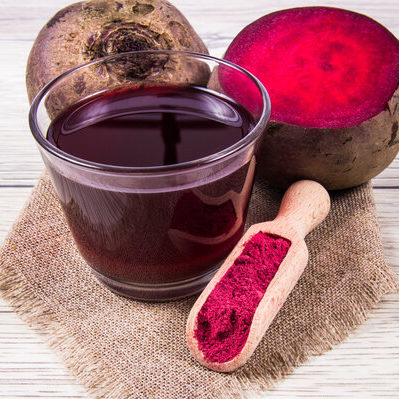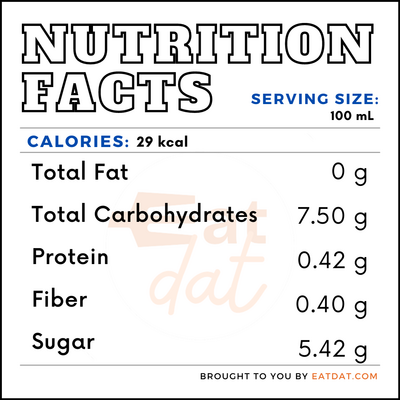
Beet Juice
What is Beet Juice?
Beet juice is the liquid extract of the beet (Beta Vulgaris), a red round-shaped root vegetable. This popular root vegetable is also known as beetroot, table beet, garden beet, or red beet.
- Beet juice comes in varying forms like cold-pressed, concentrate, and powder.
- However, they all have the same nutritional value, provided no extra ingredients are added.
Some common varieties of this root vegetable include:
- red
- golden
- striped
- cylindra
- mangel-wurzel
- sugar beets
The top beetroot juice brands on the market are:
- Beet IT
- R.W. Knudsen
- Lakewood
- Juice Performer
- Biotta
Origin of beet juice
The origin of beets dates back to ancient Egypt during the third dynasty reign. In the Middle Bronze Age, Babylonian civilization cultivated this root vegetable and around 300 BC, the ancient Greeks did as well. The leaves were consumed as food, and the roots were used for cultural ceremonies. The great Greek philosopher Hippocrates even utilized the leaves of this plant to treat injuries. However, the cultivation of the root would take place much later in the 16th century.
When prominent French chefs discovered the delicious taste of this root, they made a special delicacy by roasting it. Even Napoleon Bonaparte, the great French military leader, acknowledged the fantastic characteristics of beets. In the mid-18th century, France suffered from a substantial shortage of sugar but the discovery of sugar beets solved the problem. Beet juice gained popularity in the 19th century through ladies who used it as a lip gloss. Today, this vegetable juice is enjoyed all over the world.
Function
Beets can be used as a coloring for food items like tomato juice, jams, and sauces. They can also be processed into sugar. Common ways of using beetroot juice in the kitchen include salads, sauces, desserts, and soups (mainly borscht).
Nutrition
A 100ml serving size of this organic beet juice contains:

This drink also offers nutrients like folate, vitamin B6, calcium, iron, magnesium, copper, and zinc. Beetroot juice can benefit the body in many ways, such as:
- Increasing athletic stamina
- Reducing blood pressure
- Strengthening the heart muscles
- Preventing dementia
- Aiding in weight control
- Protecting the liver
- Reducing the risk of developing cancer
Nonetheless, there are some side effects associated with beet juice. First of all, the powerful coloring in this root vegetable may change the color of your urine and stool to red or pink. If you experience this side effect, don’t panic because it poses no threat to your body. Furthermore, if you already have low blood pressure, drinking beetroot juice can reduce your blood pressure even more. Finally, if you are likely to develop calcium oxalate kidney stones, you should avoid consuming this juice.
Commercial production
The variety of beet plays a significant role in the commercial production of beet juice. The first stage of the commercial production of beet juice involves harvesting beets from the field and transporting them to the factory. The beets are then washed and peeled by a root vegetable washing and peeler machine. Sand, stones, weeds, and any other particles are all removed.
The second stage involves cutting the beets into slices or strips with a directional vegetable cutting machine. The third stage is juicing, which a screw juice extractor machine automatically does. The fourth stage is purifying. Finally, the last stage is bottling the juice. In 2018, the worldwide market value of beet juice was $4.31 billion and was expected to grow by 5.7% from 2019 to 2025.
Application
This delicious juice can be easily made at home. Properly storing it will enable you to get the best nutritional value. Beet juice can be refrigerated, frozen, or canned, according to which method you prefer. Fresh juices last for varying periods in the fridge, depending on the type of juicer you use.
Juice made with centrifugal juicers lasts for 24 hours in the refrigerator. Whereas, masticating juicer drinks last up to 3 days. Furthermore, freezing juices can allow them to last up to six months. You can even use your beet juice to make extraordinary wine.
Beet juice recipes
This vegetable juice blends well with other fruits. Here are some popular recipes to try:
- Apple Carrot Beet Ginger Juice
- Red Beetroot, Apple, and Celery Juice
- Naturally Sweet Lemon Ginger Power Beet Juice
- Beet-Carrot-Apple Juice
- Beet, Pineapple, Carrot, and Lemon Juice
- Raw Beetroot and Cucumber Detox Juice
FDA Regulation
The FDA classifies beets as rarely consumed raw produce, which means they don’t regulate their growing, harvesting, or handling. They also classify beet juice as a color additive when used deliberately as a color, as in pink lemonade. The FDA details the requirements for specific standardization of canned vegetables like beets and beet green, providing their sources and optional forms of ingredients. They also recognize sugar beet juice as the main ingredient in the production of sucrose, which is regarded as a generally safe food substance.
References
“Beetroot Juice: 6 Health Benefits, Nutrition, and How to Use It.” MedicalNewsToday.com, MediLexicon International, www.medicalnewstoday.com/articles/324898
“History of Beetroot – Historical Uses of Beetroots.” vegetablefacts.net, Beetroot History – Origin and Historical Uses of Beetroot, www.vegetablefacts.net/vegetable-history/beetroot-history/
“CFR – Code of Federal Regulations, Title 21.” Accessdata.fda.gov, U.S Food & Drug Administration, 1 Apr. 2019 https://www.accessdata.fda.gov/scripts/cdrh/cfdocs/cfcfr/CFRSearch.cfm?fr=112.2&SearchTerm=beet
